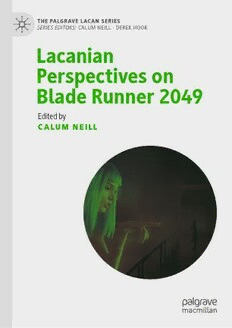
Lacanian Perspectives on Blade Runner 2049 PDF
Preview Lacanian Perspectives on Blade Runner 2049
THE PALGRAVE LACAN SERIES SERIES EDITORS: CALUM NEILL · DEREK HOOK Lacanian Perspectives on Blade Runner 2049 Edited by calum neill The Palgrave Lacan Series Series Editors Calum Neill Edinburgh Napier University Edinburgh, UK Derek Hook Duquesne University Pittsburgh, USA Jacques Lacan is one of the most important and influential thinkers of the 20th century. The reach of this influence continues to grow as we settle into the 21st century, the resonance of Lacan’s thought arguably only beginning now to be properly felt, both in terms of its application to clinical matters and in its application to a range of human activities and interests.The Palgrave Lacan Series is a book series for the best new writingintheLacanianfield,givingvoicetotheleadingwritersofanew generationofLacanianthought.Theserieswillcompriseoriginalmono- graphsandthematic,multi-authoredcollections.Thebooksintheseries will explore aspects of Lacan’s theory from new perspectives and with original insights. There will be books focused on particular areas of or issues in clinical work. There will be books focused on applying Laca- nian theory to areas and issues beyond the clinic, to matters of society, politics,theartsandculture.Eachbook,whateveritsparticularconcern, willworktoexpandourunderstandingofLacan’stheoryanditsvaluein the 21st century. More information about this series at http://www.palgrave.com/gp/series/15116 Calum Neill Editor Lacanian Perspectives on Blade Runner 2049 Editor Calum Neill School of Applied Sciences Edinburgh Napier University Edinburgh, UK The Palgrave Lacan Series ISBN 978-3-030-56753-8 ISBN 978-3-030-56754-5 (eBook) https://doi.org/10.1007/978-3-030-56754-5 ©The Editor(s) (if applicable) andThe Author(s), under exclusive license to Springer Nature Switzerland AG 2021 This work is subject to copyright. All rights are solely and exclusively licensed by the Publisher, whetherthewholeorpartofthematerialisconcerned,specificallytherightsoftranslation,reprinting, reuse of illustrations, recitation, broadcasting, reproduction on microfilms or in any other physical way,andtransmissionorinformationstorageandretrieval,electronicadaptation,computersoftware, or by similar or dissimilar methodology now known or hereafter developed. The use of general descriptive names, registered names, trademarks, service marks, etc. in this publicationdoesnot imply,evenintheabsenceof aspecific statement,thatsuch namesareexempt from the relevant protective laws and regulations and therefore free for general use. Thepublisher,theauthorsandtheeditorsaresafetoassumethattheadviceandinformationinthis book are believed to be true and accurate at the date of publication. Neither the publisher nor the authors or the editors give a warranty, expressed or implied, with respect to the material contained herein or for any errors or omissions that may have been made.The publisher remains neutral with regard to jurisdictional claims in published maps and institutional affiliations. Cover illustration: Pictorial Press Ltd/Alamy Stock Photo ThisPalgraveMacmillanimprintispublishedbytheregisteredcompanySpringerNatureSwitzerland AG The registered company address is: Gewerbestrasse 11, 6330 Cham, Switzerland For Claire, with one more kiss, dear. Contents 1 From Voight-Kampff to Baseline Test: By Way of an Introduction 1 Calum Neill 2 Do Filminds Dream of Celluloid Sheep? Lacan, Filmosophy and Blade Runner 2049 13 BenTyrer 3 Blade Runner 2049: A View of Post-Human Capitalism 41 Slavoj Žižek 4 Between the Capitalist and the Cop: The Path of Revolution in Blade Runner 2049 53 Todd McGowan 5 ‘ToBeHomesickwithNoPlacetoGo’:ThePhantom of the Sinthome and the Joi of Sex 83 Daniel Bristow vii viii Contents 6 Home Bodies: Prosthetic People and Economies of Desire 103 Timothy Richardson 7 Object Oriented Subjectivity: Capitalism and Desire in Blade Runner 2049 121 Matthew Flisfeder 8 What Happens When the Replicants Become Extimate? On the Uncanny Cut of the Capitalocene in Blade Runner 2049 139 Alexander Bove 9 In Anxious Anticipation of Our Imminent Obsolescence 167 Scott Contreras-Koterbay 10 “Before We Even Know What We Are, We Fear to Lose It”:The Missing Object of the Primal Scene 189 Isabel Millar 11 Women Between Worlds: A Psychoanalysis of Sex in Blade Runner 2049 209 Sheila Kunkle Index 229 Notes on Contributors Alexander Bove is an associate professor of English at Pacific Univer- sity, where he teaches courses in nineteenth-century British literature, criticaltheory,andfilmtheory.Hisarticleshaveappearedinseveraljour- nals,includingLFQ:Literature/FilmQuarterly,Mediations:Journalofthe Marxist Literary Group, ELH: English Literary History, and V21 Collec- tive. He is author of the book Spectral Dickens: The Uncanny Forms of NovelisticCharacterization,forthcomingonManchesterUniversityPress, and is currently at work on a book entitled Extimate Materialism that ExplorestheRelationBetweenFilm andthenovelthroughcriticaltheories of comedy, the uncanny, and characterization. Daniel Bristow is a psychoanalyst and writer, and co-creator of the EverydayAnalysisproject.HehaspublishedwidelyonLacanianpsycho- analysis, critical theory, and politics, and is author of Joyce and Lacan: Reading, Writing, and Psychoanalysis, and 2001: A Space Odyssey and LacanianPsychoanalyticTheory,whichisalsointhePalgraveLacanSeries. Scott Contreras-Koterbay receivedhisPh.D.fromtheUniversityofSt Andrews and is a professor in both the Department of Art & Design ix x Notes on Contributors and the Department of Philosophy & Humanities at East Tennessee State University, where he teaches aesthetics, the aesthetics of tech- nology, artistic identity and contemporary art history as well as being the Director of the Bert C. Bach Fine & Performing Arts Scholars program in the Honors College. He is the author of The Potential Role ofArtinKierkegaard’sDescriptionoftheIndividual (2004)andco-author with Łukasz Mirocha ofThe New Aesthetic and Art: Constellations of the Postdigital (2016). Matthew Flisfeder is associate professor of Rhetoric and Communica- tions atThe University of Winnipeg, Canada. He is the author of Algo- rithmicDesire:TowardaNewStructuralistTheoryofSocialMedia (2021), Postmodern Theory and Blade Runner (2017), and The Symbolic, The Sublime, and Slavoj Žižek’sTheory of Film (2012), and co-editor of Žižek and Media Studies: A Reader. Sheila Kunkle is associate professor of Individualized Studies at Metropolitan State University. She has published numerous articles on psychoanalysisandculture,andcontributedchaptersonthepsychoanal- ysis of film to Psychoanalyzing Cinema (Jan Jagodzinski, ed. 2012) and Lars Von Tier’s Women (Rex Butler and David Denny, eds., 2017), as well as edited the collection, Cinematic Cuts: Theorizing Film Endings (SUNY Press, 2016). Todd McGowan teaches theory and film at the University of Vermont. He is the author of Universality and Identity Politics, Emancipation After Hegel, Only a Joke Can Save Us: A Theory of Comedy, Capitalism and Desire, and other works. He is the co-editor of the Diaeresis series with Slavoj Žižek and Adrian Johnston at Northwestern University Press and editor of the FilmTheory in Practice series at Bloomsbury. Isabel Millar recently received her Ph.D. in psychoanalysis and philos- ophy from Kingston University. Her thesis is entitled “The Psychoanal- ysisofArtificialIntelligence.”HerworkhasappearedinStillpointMaga- zine, Psychoanalytische Perspectieven, Vestigia, JCFAR journal, and forth- coming publications for the Courtauld Institute of Art and Precog Maga- zine. She is also a screenwriter and psychoanalytic script consultant for film andTV.
